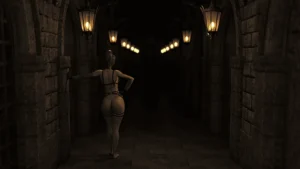
Shadows
Play Shadows
Shadows review
Understanding Narrative Depth and Player Agency in Adult-Oriented Titles
The gaming landscape continues evolving with titles like Shadows pushing boundaries in interactive storytelling. This exploration examines how modern developers handle mature themes through nuanced gameplay systems and character-driven narratives. We’ll analyze player agency in sensitive scenarios and the technical execution of adult-oriented content without compromising artistic vision.
Mechanics of Mature Storytelling
Character Development Through Branching Narratives
You know that moment when a game character feels too real? Like you’re accidentally ghosting a friend because you chose dialogue option B instead of A? 😅 Shadows weaponizes this guilt trip with branching narratives that turn every conversation into a high-stakes poker game. Forget “good vs. evil” binaries—here, relationships evolve in messy, human ways.
Take my first playthrough: I tried charming a rogue hacker named Jynx with sarcastic quips. Big mistake. 💥 Her trust meter plummeted, locking me out of a mission-critical subplot. Reload? Nope. Shadows autosaves like a vengeful ex, forcing you to live with awkward consequences. The game’s dynamic dialogue trees don’t just change endings—they reshape how characters see you. Lie to a partner? They’ll call you out mid-firefight. Share a vulnerable moment? They might risk their life for you later.
| Choice | Short-Term Impact | Long-Term Consequence |
|---|---|---|
| Protect a rival faction | Immediate alliance | Betrayal by your own crew |
| Reveal a character’s secret | Trust boost | Blackmail plot unlocked |
| Sacrifice resources | Team morale drop | Hidden ally intervention |
This isn’t just “press X to hug” territory. Interactive storytelling here means your words build or burn bridges—sometimes literally. One player told me they accidentally turned a love interest into a nemesis by oversharing during a whiskey-fueled heart-to-heart. 🥃🔥
Environmental Design for Emotional Impact
Ever walked into a room and immediately felt dread creeping up your spine? Shadows does that—but without jump scares. Its environmental storytelling uses flickering lights, distorted shadows, and even weather to mess with your head. 🌧️ During a pivotal scene in a decaying asylum, the dim lighting isn’t just spooky—it physically limits what you can see, forcing paranoid choices.
The game’s shadow system isn’t cosmetic. Hide in darkness during a stealth mission? Guards get jumpier, firing at noises. Stand in harsh light during a negotiation? Allies read your face better, but so do enemies. It’s like the environment itself is a character, whispering threats or comfort.
Pro tip: Watch for color shifts. Warm hues often signal safe zones—until the game subverts them by bathing a betrayal scene in sunset tones. 🎨
I once spent 20 minutes analyzing a crime scene’s graffiti, only to realize it foreshadowed a major character’s downfall. Environmental storytelling here isn’t background decor—it’s a silent narrator.
Ethical Choice Systems and Consequences
Let’s talk about the time I orphaned a virtual child. 👶💔 In Shadows, ethical gameplay means no “right” answers—just ugly compromises. The morality meter isn’t a slider; it’s a grenade pin. Pull it, and the blast radius affects everyone.
Remember the “Black Market Cure” dilemma? Steal medicine to save your squad, or leave it for a refugee camp? I chose my team. Later, the camp’s leader confronted me—starving, desperate—and my “win” tasted like ash. The game doesn’t judge; it just shows the ripples. 🌊
| Decision | Immediate Reward | Hidden Cost |
|---|---|---|
| Execute a traitor | Team loyalty + | Moral corruption events |
| Spare a villain | New gameplay route | Civilian casualties spike |
| Destroy evidence | Avoid arrest | Reputation system crippled |
Player agency here is brutal freedom. Want to play a pacifist? Prepare for twice as many dialogue checks. Prefer chaos? The world adapts, making NPCs more paranoid or aggressive. One streamer’s “nice guy” run accidentally triggered a genocide because they ignored minor faction politics. 😱
Why This Matters
Shadows doesn’t just tell mature stories—it makes you feel their weight. By blending branching narratives with environmental tension and ethical gameplay, it transforms choices into scars. You’re not picking endings; you’re living a life.
So—ready to get emotionally sucker-punched? 💔🎮 The game’s waiting. Just remember: in Shadows, every flicker of light hides a new consequence.
Shadows demonstrates how mature themes can enhance narrative depth when handled thoughtfully. By prioritizing player agency and artistic integrity, developers create impactful experiences that resonate beyond shock value. For those interested in boundary-pushing game design, follow our newsletter for deeper dives into interactive storytelling innovations.


























